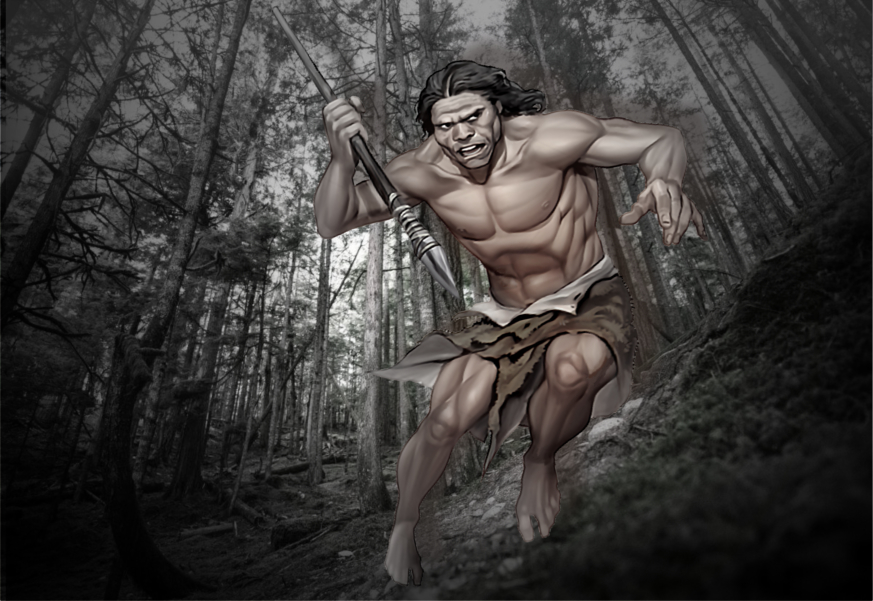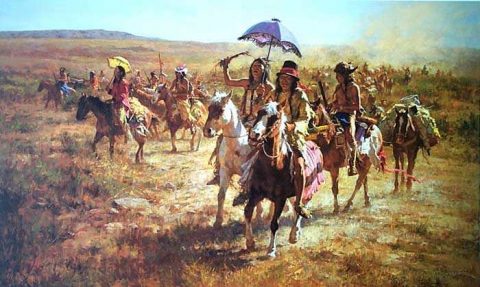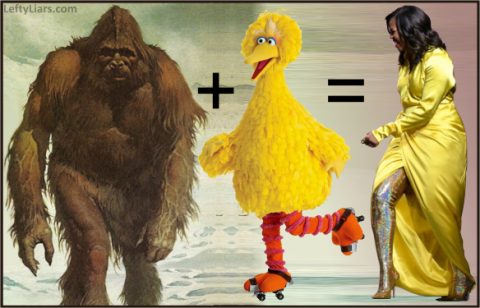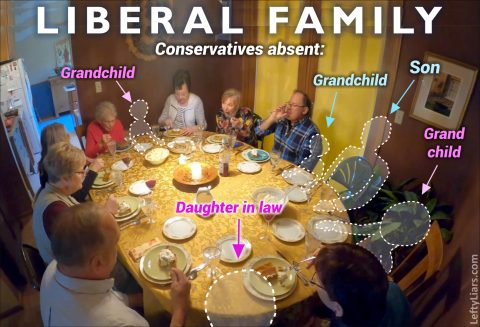
Last Monday Elizabeth Warren stood up at an NYC rally and proclaimed, “We’re not here because of men at all!” She was wearing glasses invented, designed, and made by men, and clothes manufactured by machines envisioned and built by the same. Her hair was cut using equipment devised and fabricated by the male of the species, who also discovered, made, and sold her the pills she swallowed each day to keep healthy. Likewise, her teeth are straight and white thanks to men who invented all the technology her dentist uses. She spoke into a microphone which owes its existence to menfolk, was filmed and photographed with cameras dreamt up by the same, and transmitted to the world via TV and satellites developed and created by them also. She was the result of her father’s fertile sperm and survived her early years via his income. Warren went to schools erected by hombres and drove cars invented and created by the same.
Commentary abounds regarding distinctions between the human sexes, but schools and media concoct most of it for political purposes. Accepting those falsehoods damages society, and people like Warren begin talking gibberish. Schools and Fake News tell you lies about men and women because they want society to fall apart, before replacing it with their old broken down Marxist model. As saboteurs, Lefties gain power through deceit, vandalism, thievery, violence, and misinformation.
Males/Females
To understand either sex, we need to look at their evolution over the last hundred thousand years. In prehistoric times, an average human lifespan might have been about 35 years. A lucky few lived into their sixties or seventies, but 35 was considered quite old. There was also a high child mortality rate as a result of starvation, disease, accidents, war, and animal attacks.
People were often cold, hungry, thirsty, and in pain from various ailments. Rotten teeth, gum disease, worms, ticks, fleas, other insect bites, abrasions, cuts, bruises, thorns, arthritis, infections, diseases of different kinds, fractures, sprains, boils, and many other problems made life short and painful. It was dangerous, and there was no time for arguing about changing sexual parameters.
Framework
A framework existed, defined by fundamental biological realities, like the simple fact that most females gave birth each year from their early teens until they died, and from this sprung many unavoidable truths:
Women
- Rarely, if ever, hunted.
- Stayed mostly in the base camp.
- Fed, cleaned, and protected offspring.
- Gathered berries, roots, herbs, plants, mushrooms.
- Drew and carried water and firewood.
- Prepared and cooked food.
- Made and repaired clothes, shoes, gloves, hats, blankets, etc.
- Kept fires burning.
- Taught children language, tribal rules, religion, etc.
- Counseled each other on matters of sex, health, fashion, child psychology, discipline, food, cooking, husbands, and men, including their needs, habits, and behavior.
Men
- Hunted for food, carried it home.
- Defended tribe against other tribes and animals.
- Taught children when there was time.
- Made, repaired, and maintained weapons and tools, using stone, wood, leather, bone, vines, resin, and other materials.
- Supported as many wives as they could manage.
- Gave rise to as many children as they could manage.
- Built and maintained shelters for their wives and offspring.
- Were in charge of the family but would often take advice.
- Competed with other men to position themselves in a hierarchy.
These were the basics, but there were variations on the theme and exceptions to the rules. A man would gather firewood and water when necessary. A woman might fight in his place was he sick or wounded. His offspring would also begin to take his place when old enough, in terms of hunting, warfare, and leading.
Polygamy
Prehistoric tribes had a problem keeping men and women in equal numbers. Twenty tribesmen would go away to war, with only half returning. Hunting and war killed many, so females outnumbered them, and life without a husband or father could easily be fatal in those days. You can see how polygamy would evolve in such times. After losing her husband, a woman’s sister would beg her husband to take her in. If he said no, she might offer the sister as a second wife, willing to have children and do domestic work. If the chief agreed the arrangement would go ahead, as it would help the tribe grow, which was necessary for its survival. Once this caught on, some would have three, four, or five wives. Five wives could generate six children a year, while a woman with five husbands could only produce one, so polyandry would obviously never evolve.
In time most churches would forbid polygamy, and despite their reasons, it was simple math and economics. An atheist with seven wives and forty-two children meant a total of fifty souls the church could lose, who would go forth and tell others to become atheists. In a monogamous marriage, the atheist would only have one wife and six children, so the church might only lose eight souls. Thus, to pack pews and keep coffers filled, most churches banned polygamy.
Misperceptions between sexes
The fairer sex would misunderstand men and vice versa, and it is clear how this came about. Females gave birth often. They fed, cleaned, and looked after their babies, and would discuss these issues with other moms frequently. Infants commonly died, so they would grieve together, consoling one another. There may have been complications with a woman’s reproductive areas; a subject they would discuss. Mothers would ask intimate questions and want to inspect, and give advice, and since males were away hunting, they would not hear this women’s business.
Since a girl going to relieve herself in the woods was vulnerable and scared, others would accompany her. While doing their business, they might discuss the process, asking why one took so long, or why another felt pain during the procedure, and so on. A lass might moan in pain, and others would naturally ask, “Are you okay? What happened?” and out would come the details, advice, opinion, and so on.
Males, by contrast, would go alone. Fear was considered a sign of weakness and thus masked. If a man asked others to accompany him into the forest to relieve himself because he was scared, he would be mercilessly mocked and scorned, so the habit never formed.
Females have periods. While men were away hunting, ladies would discuss the subject frequently. Older mothers would give advice on protective materials, and which herbs and potions to take, and what to say to husbands.
Since they were busy making clothes, shoes, blankets, and other things, women would chat about the technical aspects of this, and fashion. “Ooh, I love those shoes you’re stitching. Could you provide me a pair?”
“Okay, if you supply the hide. Do you want this shape or this shape?”
“Oh, I love that one. It’s so different. I’m sure it will turn the men’s heads.”
“Ooh, I know. Should we try it with this color hide?”
“Yes, even better. Oh, I do so love your shoes.”
Can you hear the beginnings of familiar female banter? Can you see how this evolved?
It continues with breastfeeding, treating sick babies, cleaning their diapers, and so on. “Oh, my nipples are so sore, and my breasts feel like they will burst.”
“Well this is your first baby, so you aren’t used to it.”
“What can I do to make it better?”
“Here, rub this on your nipples, and drink this. It will help. Also, there is a sick woman in the hut next door, and her baby is hungry. Feed him, and you’ll find the swelling goes down and you’ll be fine.”
“What if I run out of milk for mine?”
“Ahh, ye have plenty for two with those jugs. How are your nipples now?”
“A little better, but now I have to change him. He has diarrhea, I think.”
“Okay, lay him down here, and I’ll show you how to clean him.”
Prehistoric Hen Party
This kind of talk goes on all month, and then the womenfolk have a get-together. It is time to exchange gossip and trade helpful information. Their daughters and babies accompany them, as always. While this is going on the gents are having a gathering of their own, drinking a fermented meady beverage of wild oats, honey and berries, telling stories, and acting out events. Boys sit and watch. During all this, guys go off to relieve themselves in a particular part of the forest, and one fellow, a little drunk, wanders off course and finds himself close to the gaggle of females, relieving themselves in the same grove. While peeing against a tree, he listens to the ladies’ banter, and once back with his brothers, cries out, “You would not believe those females!”
“Why? What were they saying?” his mates ask, all ears.
“It was all about titties, nipples, fannies, private parts, weeing, peeing, bleeding, periods, shoes, pocketbooks, fashion, hair, makeup, and other loony stuff. I nearly burst out laughing.”
“Seriously? They are certainly strange,” one declares.
“A different species,” another agrees. “They don’t come from our world.”
Sometime later, two lassies from the ladies’ group make their way into the dark forest to relieve themselves, and cannot help overhearing the men, who are discussing war and hunting. They talk about how many weapons they will need to defend themselves against an enemy tribe, and which tools to use when killing prey.
Upon returning to their sisters, the maidens let everyone know how crazy the opposite sex are. “We heard them talking,” they laugh.
“Tell us, tell us,” others beseech them.
“All men talk about,” the damsels proclaim, “is murder, war, weapons, killing, slitting throats, shooting arrows, throwing spears, destroying enemies and stripping skin off animals. It’s disgusting!”
“Really?” others ask, their mouths agape.
“Really!” the girlfriends confirm. “They brag about how they threw their spears while running through the forest, on uneven ground, dodging trees, and estimating the curve of the path of the running pig, and how their spears sailed through an arc to hit the target.”
“Yeah,” a grandmother scoffs, “That would be typical.”
“They’re obsessed with death,” others hiss, rolling their eyes. “Men! What was God thinking when he made them?”
Communication difficulties
All this makes it difficult for men and women to talk, especially when young and inexperienced.
Scene: Two young tribes-people in 20,000 BCE sit on a cliff across from a waterfall.
Vanka: Do you like to dance?
Erko: Er, not really. I prefer to hunt.
Vanka: Why?
Erko: It’s fun.
Vanka: Killing animals is fun? I thought it was dangerous.
Erko: It is, but it feels good to get something the family can eat.
Vanka: Yech. I couldn’t do that.
Erko: You’re a girl. I couldn’t do what you do.
Vanka: Don’t you care about normal things?
Erko: Like what?
Vanka: Clothes. Shoes. Babies. Face painting.
Erko: Not as much as hunting.
Vanka: I don’t understand. You seriously only care about killing?
Erko: No, I do care about other things.
Vanka: Like what?
Erko: You.
Vanka: Me?
Erko: Are you upset?
Vanka: I have to go. Dad will kill me.
Erko: Okay. I’ll walk you back.
Vanka: No, I’ll be fine. Stay here. You might find something to kill.
Males and females have had a difficult time understanding each other for millennia, and that is perfectly natural. From the above, you can see how men evolved to be interested in:
- Defense
- Politics, war
- Hunting, Tool, and weapon-making
- War, Machines
- Construction
- Vehicles
- Time and Space
- Mathematics, Physics, Chemistry, Science, Astronomy
- Quantum Mechanics, Gravity, Computers, Robots
- Nuclear Physics, Electricity, Magnetism, Power generation
- Ballistics, Radiography, Cameras, Guns, ships, planes
- Flight, Jets, Rockets, Missiles, Satellites
- Football, baseball, sports
- Much more
You can see how women evolved to be interested in:
- Childhood development
- Nursing, midwifery, prenatal care
- Child psychology
- Endocrinology
- Communication, counseling, advising
- Therapy
- Teaching
- Massage, healing, yoga, relaxation
- Sex, health, natural remedies
- Teas, flowers, aromas
- Makeup, perfume, clothes, home-wares, bedclothes
- Art and craft, sewing, embroidery, dressmaking, clothes design
- Shoe-making, shoe designing, footwear, accessories, hats, gloves
- Artwork, photos, pictures, photography, painting
- Much more
A man and a woman will happen upon a scene where a child is lying on the ground, bleeding. The woman will rush to the child to help him, while the man will go hunting for the perpetrator.
However, when one is not present, the other can attempt both. The woman alone will attend to the child while looking around for the perp. A man alone will do the same and return later to continue that hunt.
Men and women are different, but they also have much in common.
Exceptions
As with all things in nature, there are exceptions to the rule. Occasionally you find a woman who is a great political leader, and very strong, like a man. Sometimes you come across men who are very effeminate and fragile, like women. They cross over from time to time to do work in each other’s fields, but my comments concern the vast majority.
Equality
Are women equal to men?
A male-female union is an instrument capable of creating, protecting, feeding, and raising offspring. Each sex is equally important for this function, so in that sense, they are equal.
However, if by ‘equal’ you mean ‘same,’ then no, clearly they are not the same. If aliens examined a human tribe 30,000 years ago, they would notice differences between the sexes immediately.
- Male beards and hairy, flat chests
- Beardless females and hairless breasts
- Males’ greater strength and speed
- Males’ deeper voices
- Male dominance over females
- Vigorous thrusting during sex by males
- Male hunting, warring; female homemaking
Anyone can see they were equally important, but not the same.
Those differences were on the surface, visible from the outside. To see more significant differences, we must look at what humans are capable of achieving.
Men are superior to women in fields like mathematics, science, tool-making, and composing symphonies. Feminists have tried for years to coax girls in those directions, spending billions of taxpayer dollars to arrange ‘equal’ learning, yet after many decades of this, few women care for such things, and there are no significant results. If there were you would never hear the end of it.
Biased Media
Though they never fail to stick a female host in documentaries about space, gravity, or great composers, to womansplain these things, or into a movie to play the role of a great scientist or mathematician, in real life they are no match for men in those domains.
Men are experts in these and other areas thanks to hunting, warring, and their use of thrown, shot, or catapulted missiles while charging over a changing landscape. Their brains had to evolve to cope with hunting runaway prey over three-dimensional terrain, while visually communicating with fellow hunters.
Hunting scene – 30,000 BCE
The hillside in front of a hunter angled downwards from him at 15 degrees while sloping left ten, dropping into a valley that enclosed scraggly trees, spiky bushes, stones, boulders, mounds, and ditches. The prey, a boar, was bolting crosswind, north of a large tree, behind a rock in a depression, and the huntsman used silent hand signals while running, to tell his brothers. Seeing his gestures, they aimed to head off the beast. The racing pursuer leaped over bumpy terrain towards the spot he predicted the pig would appear, spear at the ready. Noticing men the swine bolted up an incline, and, estimating its arrival at a certain point in time and space, the tribesman launched his spear to intersect it.
As the missile arced through space, and the boar continued its frantic stride, the two came together spectacularly, with the wooden lance piercing its target’s rib-cage. With a loud squeal, it fell to the ground and lay still, but for a twitching hoof. Men arrived soon after, to congratulate the hunter, hugging and jumping for joy like modern footballers celebrating touchdowns.
This ability to assess angles, space, distance, time, wind direction, to calculate the trajectory of the missile through space and its arrival in the future at a given place, to meet a moving target, gave men the ability to compose great symphonies and land rockets on the moon. They could figure out space-time, relativity, and quantum mechanics.

Women are just as gifted but in a different area. A mother had to balance looking after her babies and children with food preparation, clothes-making, other chores, and handle emotional situations at the same time, making her an expert in all related realms.
Domestic scene – 30,000 BCE
The mother Tuo had to prepare breakfast and feed her youngest baby Lhay while tending to her nine-year-old daughter’s fever. Jeet had been sick for two days. To make matters worse Tuo’s 16-year-old son Fidore was fighting again with his older sister, Pneser, who was about to give birth. Though all six children were well behaved, Pneser, the expectant 17-year-old, was abusing others. Her water had broken, and she had started going into labor, so it was time to take her to the birthing pond.
Pneser wanted to have the baby in the forest by the shrine for Prafadi, the god of births, but as it was close to the river it was a favorite place for large carnivores, and Tuo knew the salty pond was less risky. Generally, in a case like this, she would forget about everything else and take her daughter to the lake, but she had made an appointment with one of the tribal elders, a Gani woman, and it would be dangerous to stand her up.
Just then, a boy messenger arrived holding a torn shoe from the chief, who was hunting. “The chief needs this repaired immediately,” he said, breathlessly.
Again, this was not something Tuo could ignore. The 31-year-old woman was suffering from period pains, and found it hard to move, but had to get through this troublesome morning because there was a meeting at lunchtime with all the tribal mothers, and she had agreed to provide shcava, a fermented drink made from the Olcha root. It was ready in pig bladder bags, but Tuo still needed to make the drinking vessels from Watella leaves.
While Fidore yelled back at his sister, baby Lhay cried for milk, Jeet thrashed about with fever, and the messenger boy held out a broken shoe. A tribal elder was on the way, and cups needed making, so Tuo closed her eyes for a moment and pictured the entire morning in her mind. She saw all the connections and possible outcomes and envisioned a pathway to success; a plan she could use.
Opening her eyes, she turned to the boy and took his shoe. “Come back in ten minutes,” she instructed, and the boy ran away. A wild boar’s tusk had ripped the leather moccasin. Tuo found her bone needle and thread and began mending it while making her way across the hut. She used her foot to rouse her 15-year-old daughter, Ossi, from sleep. Ossi had a baby of her own, who slept beside her. At the same time, Tuo snarled at her son Fidore, saying, “Do you want your sister’s child to die?”
“What is it?” asked Ossi, rubbing her eyes.
“Feed Lhay now,” Tuo commanded, as the girl sat up obediently. She placed her baby sister on her teat, and it began feeding.
“What do you mean?” Fidore demanded, looking pale.
“If you argue with her while she’s in labor, you may vex the child, is that what you want?”
“Of course not, but she…”
“Then instead of vexing, help your sister down to the birth pond,” Tuo told Fidore, as she continued stitching the soft leather. She whistled to her seven-year-old son Smirr, who grinned at her cheekily from his bed.
“Why me?” Fidore asked, incredulously. “I’m a man.”
“You’re a man whose mother has a hundred tasks and no time,” Tuo replied firmly. “If you love me, you will help your sister and your future nephew or niece!”
“I don’t want to go to the birthing pond,” Pneser wailed, in pain. “I want to go to the…”
“There are wild animals near the shrine,” Tuo said firmly, “so we go to the lake. Fidore, take her to the pond now, and call Theresa on the way to be a midwife.”
“What do you want me for?” Smirr asked, jumping out of bed.
“Fetch the healing cloth for Jeet,” Tuo smiled.
“But I need to go to the …” Pneser began.
“I will take you to the Prafadi shrine tomorrow,” Tuo said, calmly, “with your baby, and with some security, and you can perform the ritual. Now go.”
“Ouch,” Ossi whispered, as her baby sister chewed her nipple.
“Thank you, darling,” Tuo stroked her hair. “I will give you something for that afterwards.” She finished her thread and threw the shoe on the ground near the entrance.
Fidore helped his sister Pneser up reluctantly and began to help her out of the hut. “Just don’t tell anyone about this,” he grumbled.
Outside the shelter lay a large flat stone with a natural depression about a foot deep. Water was poured into this granite recess, and boiled by adding red hot rocks. A piece of baby deerskin had been soaking in a simmering potion made up of various healing herbs, which young Smirr retrieved with a stick. After it cooled a little, he wrung it out and ran to Jeet’s bed. His nine-year-old sister had red rashes on her back and was wet with perspiration.
Tuo kissed her son and took the cloth, applying it gently to the girl’s back. “Now go and fetch me about twenty Watella leaves, as quick as you can.”
Smirr smirked at her and ran off. He was Tuo’s favorite child; a clone of his father whose spirit nobody could dampen.
“Hello,” called a hoarse voice at the entrance. It was the Gani woman, a tribal elder. She was forty years old and had painful arthritis. “Careful,” she cried out irately as the boy messenger swooped in to pick up his chief’s shoe. Without a word, he vanished, running like the wind into the forest. “Is he yours?” the Gani woman snorted, haughtily.
“He’s the chief’s messenger boy,” Tuo explained, and the Gani woman’s face changed to one of respect. “A fine boy, I’m sure,” she smiled.
“Come in,” Tuo said, “I’m just treating my daughter’s back.”
“Is this a bad time?” the elder asked.
“Not at all,” Tuo insisted, showing her to a mat on the dirt floor. “Would you like some shcava?”
“I cannot afford to get tipsy today as there is too much to do,” the elder grunted, sitting down. “You realize we’re having the…”
“Yes, I’m just about to…”
“And who is this?”
Smirr appeared with an armful of Watella leaves and placed them on the floor near his mother. He was followed by Fidore, who announced he was going hunting and disappeared.
“My son, Smirr,” Tuo smiled. She gave her cloth to the boy, saying, “Put this back in the potion, and bring some drinking water for Jeet.”
“He’s a fine lad,” the tribal elder commented as Smirr followed orders.
Tuo turned to her and bowed her head. “Sorry for the commotion. How can I help you?”
“It’s fine,” the elder coughed. “I wanted to ask if you could help tomorrow at my granddaughter’s wedding.”
“If I can I will,” Tuo found herself saying, though she hated the idea. “What can I do for you?”
“You are such a good seamstress,” the elder gushed, “and the best cook in our tribe. I would be so pleased if you could help my granddaughter with her dress, and then with the main course.”
“I would be pleased to help,” Tuo nodded. “And what is the main course?”
“A twenty-foot python, two pigs, plenty of fruit, and shcava to go with it,” the elder chuckled.
Ossi, Tuo’s fifteen-year-old daughter, finished feeding Lhay and set her down to sleep. She stood up and stretched, while Smirr helped Jeet drink water from a small bowl.
As Tuo spoke to the elder, she motioned to Ossi and Smirr, who began quietly making the Watella leaves into cups.
“I will leave you to it then,” the elder announced. The old woman hobbled out of the hut and was gone, and Tuo set off to the birth pond, where she found her daughter lying. Theresa, the midwife, lay beside her, chatting.
This ability to organize children, elders, nursing, events, meetings, to calculate future needs and requirements while solving emotional problems and arguments, while performing multiple duties to make family interactions function smoothly within a tribe, gave women the ability to find solutions to complex community issues. Though they evolved to stay at home to look after children, this amazing ability allowed them to give their husbands invaluable advice in handling people, which in turn they used in the world of politics and commerce. For instance, the American Revolution, the Declaration of Independence, and the ratified Bill of Rights would never have come about without the Founder’s wives’ advice and judgment, nor the Founder’s mother’s teachings and discipline.
Great men often only achieve great things with the help of mothers and wives. Delete George Washington’s mother, Mary Ball Washington, and wife, Martha Washington, from his life, and the poor man would never have had the character, strength, money, connections, or wherewithal to take on the British and win. He would probably have just been another ordinary planter, drinking ale in the local bar and raising a family, subservient to the British. Americans today might still be sipping tea, being overtaxed, and worshiping royal environmentalists.
Males and females were meant to be together. They are two halves of a mighty family-making entity, essential for a healthy tribe or society. Looking at the logos above, notice the new design is joined to represent male-female marriage. The *images are symbolic of how males and females work together in a union. You can visualize the female holding up the male, or giving the male energy to move upwards, which is what happens. The female helps the male accomplish his goals, which contradicts the feminist lie about men enslaving women. In reality, men support women, who in turn incentivize men.
*I have uploaded high res versions of these logos here, here, and here. Use freely with reference to this site.
According to feminazis, males are “toxic” and hold women down. They want women to replace men, and for men to be redundant, which destroys families and wrecks children. By destroying the fabric of society, they can encourage people to “rebuild” using the soviet model.
A better choice
The best way for women to succeed and acquire wealth, outside of inheritance, is through their husbands and children. Rather than don men’s clothes and go to work, women should raise children and help their husbands succeed in their work. On the one hand, they are creating future entrepreneurs, and on the other, they are spurring their men to achieve. Wives can help husbands make decisions that give them a pathway to the top. As men earn more, wives benefit, as do their children. As offspring become wealthy, parents also gain.
The key to all this is loyalty between husband, wife, parents, and children, and it cannot work unless children are correctly disciplined, using proper methods from the past. Offspring who are not raised appropriately spoil and spoiled children create too much strain on marriages, which may then fall apart.
Above all, women must stop listening to feminists, who are marriage’s arch-enemies. The termites of any marital arrangement, they destroy would-be children, grandchildren, great-grandchildren, family in-laws, along with associated friends, business, and any fortune gained from the same. Once feminists have eaten your marriage out, they rejoice on your misfortune and gloat about the wreckage caused, like wicked vultures, cackling on the bones of what was your life.
Women: never listen to fools like Elizabeth Warren. Value men, because in valuing them you are valuing yourselves and your children.
Men: never listen to feminazis. Cherish loyal women who treasure good men, as they will help you build the most celebrated families.









